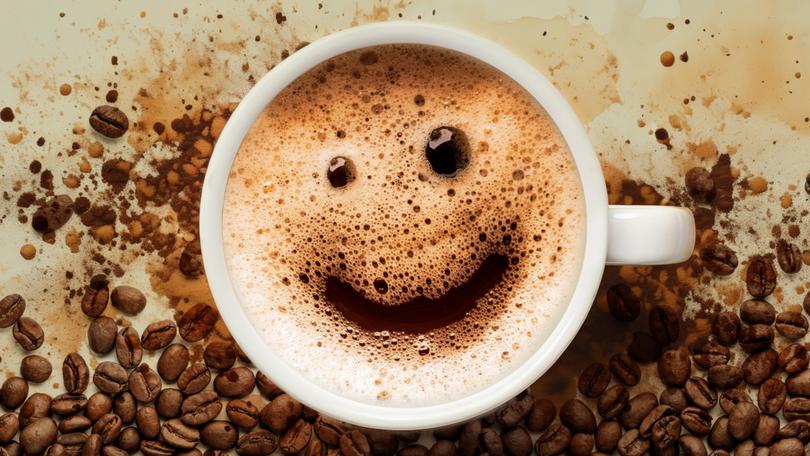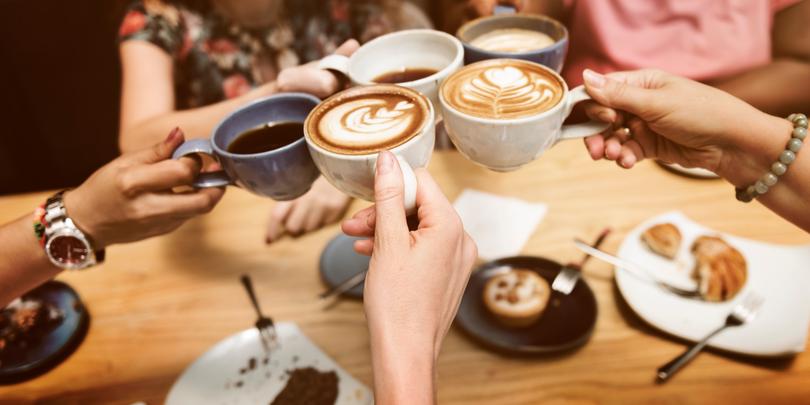GEMMA ACTON: Even at $5.50, my daily cup of coffee is a bargain. Here’s why I won’t give it up
GEMMA ACTON: Like many Aussies, I’ve found plenty of ways to cut my spending amid a cost-of-living crisis. But giving up my 30 minutes of peace and quiet at a cafe is not going to be one of them.

They say the simple things in life are often the best and with good reason.
A spectacular sunset, an invigorating bike ride with the kids or getting stuck into a page-turning novel on a wintry night in can all fill up your cup to the brim.
While some of these luxuries are free, others are increasingly striking me as surprisingly good value in a world of aggressive price rises.
Sign up to The Nightly's newsletters.
Get the first look at the digital newspaper, curated daily stories and breaking headlines delivered to your inbox.
By continuing you agree to our Terms and Privacy Policy.Like many Aussies, while I’ve found myriad inventive ways to slice my spending to counter the rabid inflation of recent years, I am still clinging on tight to my daily barista-made coffee and half an hour of peace and quiet in a cafe.
The caffeine hit is appreciated and yet it’s more a habitual than a physical compulsion and as I’ve never had much success with meditation or yoga, the solitary unpressured reading time in a fisherman’s cafe with a pretty view helps to decompress. In sum, it’s ticking a lot of boxes for just $4 a day.
A Statista survey from two years ago cites three in every four Australians saying they enjoy at least one cup of coffee a day. Add that all up and each of us consumes on average close to 2kg of coffee beans annually.
Australia — and some cities in particular (hello Melbourne!) — has a world-leading coffee culture of which it is rightly proud. Thousands of baristas make magic every morning with nothing more than beans, water, milk and an artistic sprinkling of ground chocolate.
What we don’t do so well is grow the raw commodity. Only 1 per cent of the beans we consume are produced domestically. With such a heavy dependence on imported beans, we’re subject to the whims and winds of foreign growers — and those winds have not been blowing in the right direction of late.
To generalise, your cafe-bought flat white or latte will likely be brewed using arabica beans. Your supermarket-bought instant coffee will likely be derived from the stronger robusta beans.
There’s a significant consumer market for both here. The price of robusta bean futures has jumped by nearly two-thirds in the past year to a record high, while arabica bean futures prices remain below the peak reached in 2022 but are still well above the long-term average.
Anticipated crop-decimating heatwaves in the world’s second-largest bean producer, Vietnam, and third-largest, Indonesia, have sent prices soaring.
Producing consistent coffee crops year after year is a tough gig in a world that’s continually getting a little hotter. Consequently, some regional growers have recently switched over their coffee allotments for crops like rubber which survive better in humidity.
Less supply is bumping up against rising global demand. Twice the amount of coffee is consumed today in Indonesia compared to a decade ago. In a country of nearly 300 million people, in absolute terms, that’s a lot of extra beans.
By the end of last year, China had more branded coffee shops than the US — around 50,000. For years, the country of 1.4 billion has been the largest overseas market for mega-chain Starbucks and demand in China continues to increase.
The net result is that global stockpiles of coffee currently sit around record lows. Coffee prices are notoriously volatile and it’s possible both arabica and robusta bean futures prices will start trending downwards again before cafes and manufacturers pass on the cost increases to customers.
If that happens, don’t bother switching to hot chocolate. Cocoa prices are also at peak levels after nearly tripling over the past year.

While the $4 I pay at my local cafe for a high-quality cappuccino seems outrageously good value, even those on offer in a more expensive part of town near my office only range between $5 and $5.50.
Looked at one way that’s a 27 per cent mark-up. Looked at another way, that’s still great value for a winning taste, calorie, caffeine and relaxation hit.
Beyond the volatile prices of the raw commodities, cafe operators have faced a swathe of rising input costs from energy to rents to staff wages in recent years.
While milk prices have also gone up by 20 per cent in the past couple of years, some of that will soon be retraced according to the latest official projections which have the nominal farm gate price falling by 4 per cent this year and 6 per cent next year.
Over that period, I can think of only a couple of cafes that have raised their prices by 25 cents per coffee.
The most brilliant cafe invention for cafes and customers alike has to be the babycino. For the kid-friendly, half-cup of frothy milk and a marshmallow, cafes today charge as much as $3.50 which must deliver them an attractive margin, remembering that a marshmallow from a standard supermarket package costs around 8 cents.
To a customer that price tag might sound like a lot at first — but when frazzled parents can use it as a bargaining tool with incentive schemes like: “If you pack up all your books we might go and get a babycino”, it seems like a very reasonable price to pay.
In the grand scheme of what we stump up to keep our children safe, quiet and happy, it’s a definite bargain.
Gemma Acton is the Seven Network’s finance editor.

